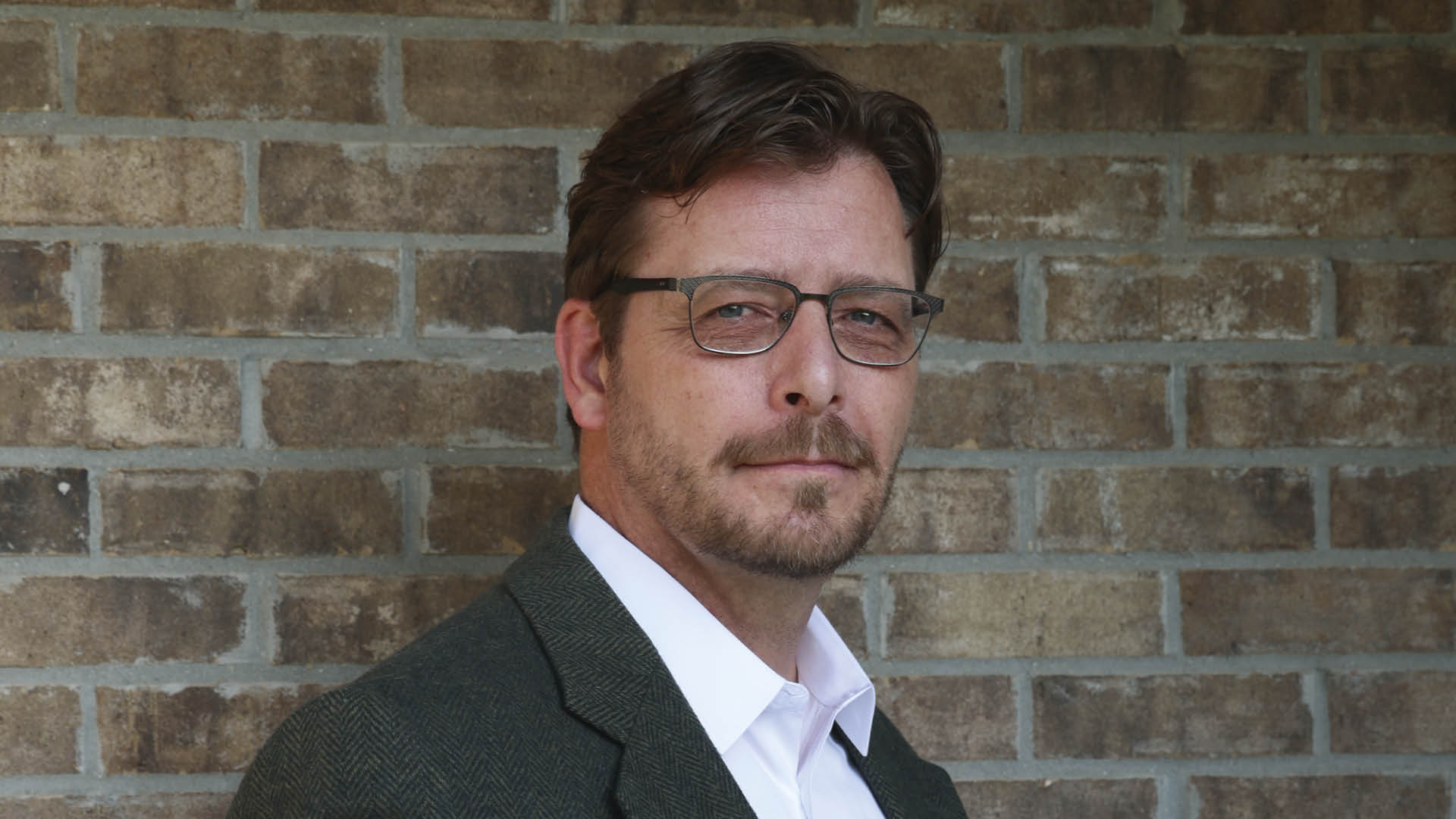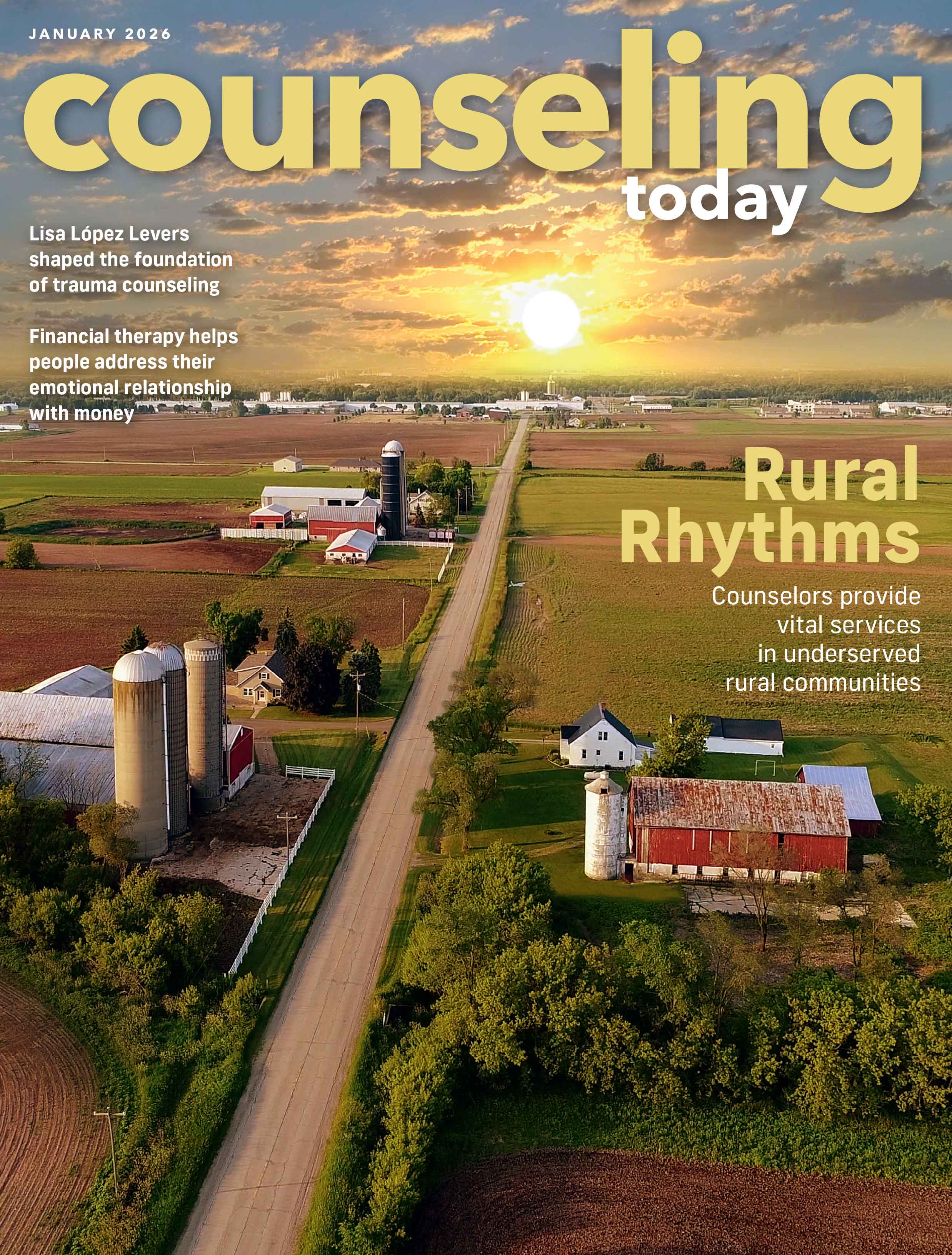War Zone Counseling
By Mike De Socio
September 2025

When Russia invaded Ukraine in 2022, setting off a war that continues to rage on, David A. Olges, PhD, MBA, LMHC, quickly realized he didn’t have the luxury of choosing what his role would be in the conflict.
Olges, who had been helping to lead a charitable foundation for children with disabilities in Ukraine since 2000, surveyed the unfolding chaos and knew he had to do what he does best: counseling.
“I don’t need to stop a war. No one person can do that, but I can do my part,” says Olges, an associate dean and director of the clinical mental health counseling program at Southern New Hampshire University. “And maybe if I do my part, and other folks do their part, we throw off this war, and maybe it makes a difference for folks.”
From his office in the U.S., Olges began offering free virtual counseling sessions to people in Ukraine — to anybody who needed help, but especially to civilians who were making gut-wrenching decisions about whether to leave or stay as the invasion progressed. The work thrust him into new counseling terrain, where he was forced to rethink some of the field’s basic assumptions and develop new practices.
Fast forward three years, and Olges has distinguished himself as a leading expert on counseling in the context of war. He’s not only helped many individual Ukrainians, but he has started to refine best practices, filling a gap in the existing academic literature on counseling. The work has earned him international recognition. Olges has been invited to speak at a national university in Kyiv and to address Ukraine’s parliamentary body. Back home, ACA honored him with the Kitty Cole Human Rights Award in 2023 and 2025.
Finding His Mission
These accolades shine a spotlight on the power of counseling to help people in times of crisis, which first drew Olges into the profession some 30 years ago. He entered his undergraduate education with aspirations to become a lawyer, but a roommate who planned to become a counselor prompted Olges to shift his own path. (That roommate is now a lawyer.)
Olges had long been reflecting on his religious faith, particularly on the imperative to care for one another, and at a certain point he realized counseling might be a way to accomplish that. He went to graduate school to pursue the career and started exploring how to help people with serious mental health issues. A stint working in a hospital’s psychiatric unit connected him to patients with paranoid schizophrenia, suicidal ideation and eating disorders. That experience showed him how he could use counseling to connect with people no matter what they were dealing with. It cemented his passion for the work, and he hasn’t looked back, forging a career that has involved specializations in couples counseling, disordered eating, teens and Division 1 athletes. Along the way, he has also taught at the undergraduate, graduate and doctoral levels.
His work in Ukraine began early in his career, in 2000, well before the current conflict with Russia. Back then, Olges was pulled into a nonprofit, Mission to Ukraine, that was being started by a friend. Olges flew to Ukraine, where he made important connections and planted the seeds for what has become a lifelong commitment to the region. He counts nearly 25 trips to Ukraine, all of them focused on counseling work.
Mission to Ukraine works primarily with children with disabilities, as well as women facing unplanned pregnancies. It offers counseling, medical care, dentistry, physical therapy and occupational therapy. Olges has been on the executive board of the nonprofit and now serves on the advisory board.
But Olges’ work in Ukraine quickly grew beyond the scope of the nonprofit. When he first started traveling to the country, he says counseling as a profession did not exist there as it does in the U.S. So beyond making an impact on individual Ukrainians, Olges’ counseling services caught the attention of local academics, who wanted to learn more about the vocation. Before long, he was speaking at Taras Shevchenko National University of Kyiv and helping to build the profession of counseling in Ukraine.
Over the past decade especially, Olges says the field of counseling is growing in Ukraine as practitioners and academics establish standards and develop curriculum. “It is picking up. And it’s moving rather quickly, barring the impact of a full-scale invasion from Russia,” he says.
Counseling Civilians During War
The current war only increased the need for counseling services, and Olges has done his part to help. In 2022, he started offering multiple online sessions to Ukrainians every week, and by 2023 he had provided 112 hours of counseling. He also tracked friends and their relatives who were displaced due to the war and spoke with them online intermittently in Czech Republic, England, Germany, Italy, Lithuania, Poland and Sweden, and he worked with Ukrainians who were already living in Warsaw, Poland, as they sought to assist new refugees.
All the while, he started noticing themes, so he decided to do a review of the literature about treating civilians living in a war zone. What he found surprised him: While there was plenty of material on treating refugees or military veterans, there was scant research on the mental health needs of civilians staying and living in a war zone — precisely the population he was seeing.
His own work illuminated some of the challenges: “We’re working in a completely different context than we typically are,” he says. “War is a trauma to everyone in the country. … It’s an open-ended trauma because it keeps going on every day.”
This fact changes many assumptions about how to do counseling. Typically, someone sees a counselor after a traumatic event is over, but Olges was seeing people as they were living through a traumatic event without a clear end. This can change how he even diagnoses a client.
“If a client comes into my office today and says, ‘I’ve got anxiety,’ well then, we work to resolve the anxiety. But if I’m in a war zone and they say, ‘I have anxiety because a tank keeps rolling down my street,’ maybe you should keep that anxiety, maybe that’s a good thing. So we don’t want to treat that.” Olges also has no guarantee that he’ll see a client again after one or two sessions, so he doesn’t always have time to fully resolve an issue. Instead, he focuses on building resilience.
These practices are coalescing into new standards for conflict-zone counseling that Olges is sharing throughout the region. In November 2022, he traveled to Warsaw to support refugees and train first responders, medical personnel and mental health professionals. His presentation, “Mental Health First Aid in a Conflict Zone,” was attended by 150 practitioners and first responders and streamed into Ukraine with simultaneous translations.
In 2024, Olges returned to the region. He started with visits to Ukrainian refugees in Amsterdam and Warsaw but then made a treacherous journey into Ukraine that involved a three-hour border crossing and several armed military checkpoints. Once there, he provided additional training to Ukrainian medical professionals on treating persistent trauma and practicing resilience. He also met with the Ukrainian Army Chaplain Corps to discuss resilience training and trauma counseling and provided group and individual counseling.
With the war now in its fourth year, Olges has also been able to assess which interventions have been most effective in counseling Ukrainians through the conflict. He has found resilience training to be particularly helpful and notes that eye movement desensitization and reprocessing techniques — including body scan, imagery, tapping and tactile bilateral stimulation — have also proven effective.
There’s also been evidence that Ukrainians benefit from a short-term, rather than long-term, view of their future; rather than fostering optimism, or carrying cynicism, about the end of the war, they can see more success by focusing on how to find meaning in each individual day. Reflecting on what they did right to survive another day can help restore the confidence and self-assurance they need to successfully navigate each day living in a conflict zone, he says.
This work on mental health for civilians living in conflict zones promises to fill a significant gap in academic literature, Olges says. Importantly, the best practices being developed in Ukraine can be transferred and applied to conflict zones around the world.
And while the work has earned him significant accolades, Olges resists the temptation to see himself as especially smart or brave for doing this work. “I didn’t find any courage,” he says. “What I found was my responsibility to my friends. And I think that’s where all human rights work starts.”


